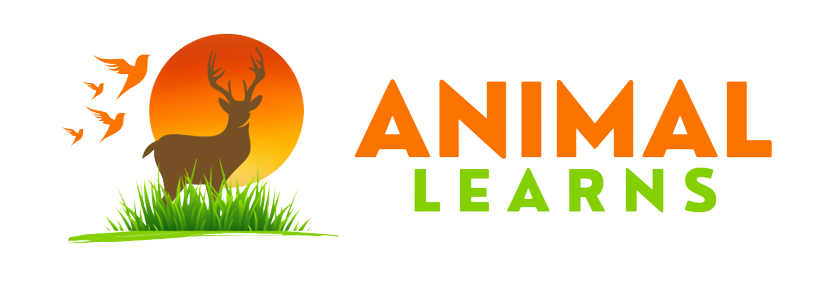What Animals Eat Apples? (17 Amazing Examples with Pictures)
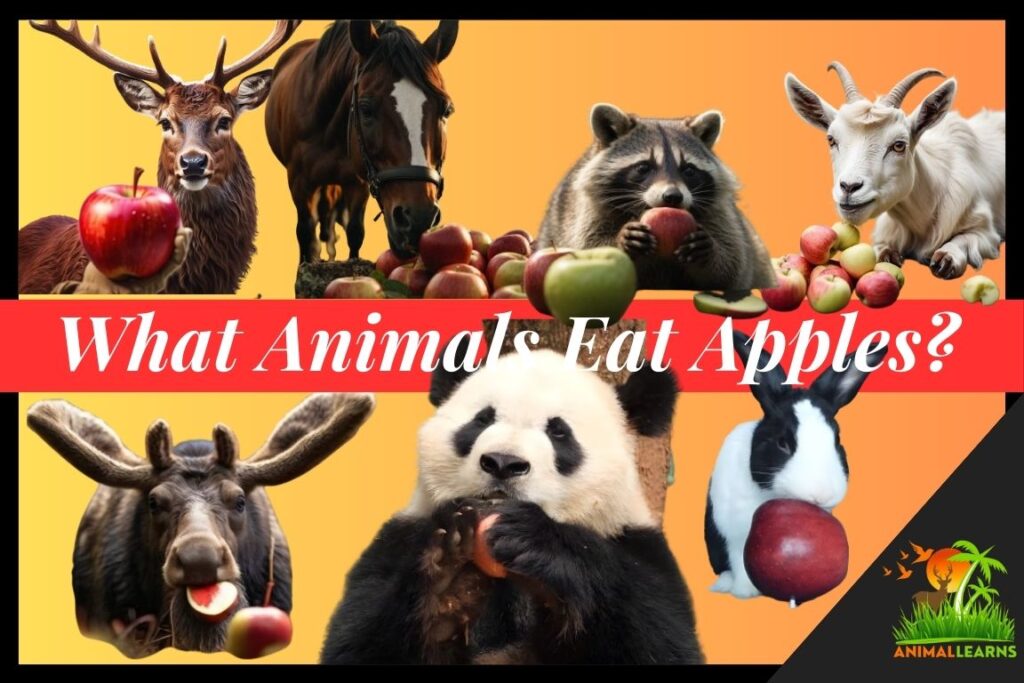
In the wild, apples may also grow, so if you’re curious about what animals eat apples, you may be surprised to learn some surprising facts. Many little animals find that apples are a fantastic supply of sugar and protein, but larger, predatory creatures also consume apples.
Did you know that apples may also be found growing organically in the wild? Most people only think of apples as a delicious pleasure. Numerous animals genuinely like chowing down on these mouthwatering fruits. Apples are a great way for small animals like deer, chipmunks, and rabbits to replenish their energy.
What Animals Eat Apples?
Contents
Horses

Scientific name: Equus ferus caballus
Apples and horses have a long history together, with art and tales frequently featuring them as a traditional treat. They are, in reality, a completely healthy and harmless treat for these magnificent animals on occasion.
As with any treat, moderation is essential. A few apples won’t hurt you, but consuming too many might result in stomach problems like colic. Since horses’ digestive systems are sensitive, consuming a lot of sugar from fruits might alter their intestinal flora.
Raccoons
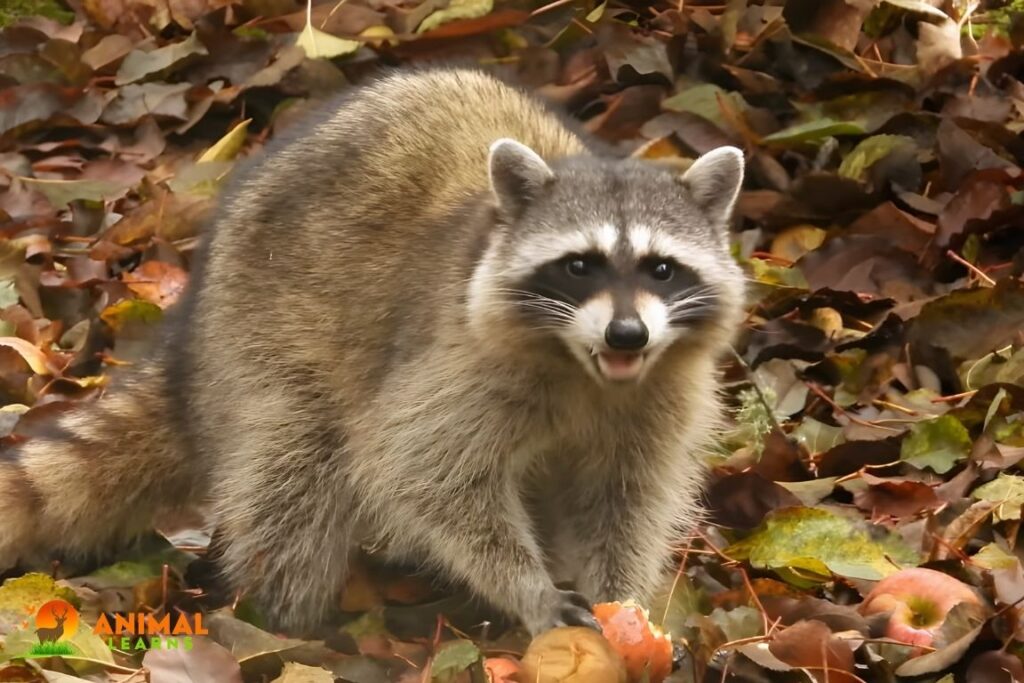
Scientific name: Procyon lotor
In addition to being extremely cunning and persistent, raccoons are also diverse eaters, consuming almost anything their little paws can get their hands on. Homeowners in raccoon-populated regions should take additional precautions to make sure no fruits are left unreachable for the scavengers, as apples are undoubtedly on their list of favorite snacks.
Raccoons will frequently walk as far as orchards to investigate their favorite foods, even if the apple has been ignored and is now a little too ripe.
Bears
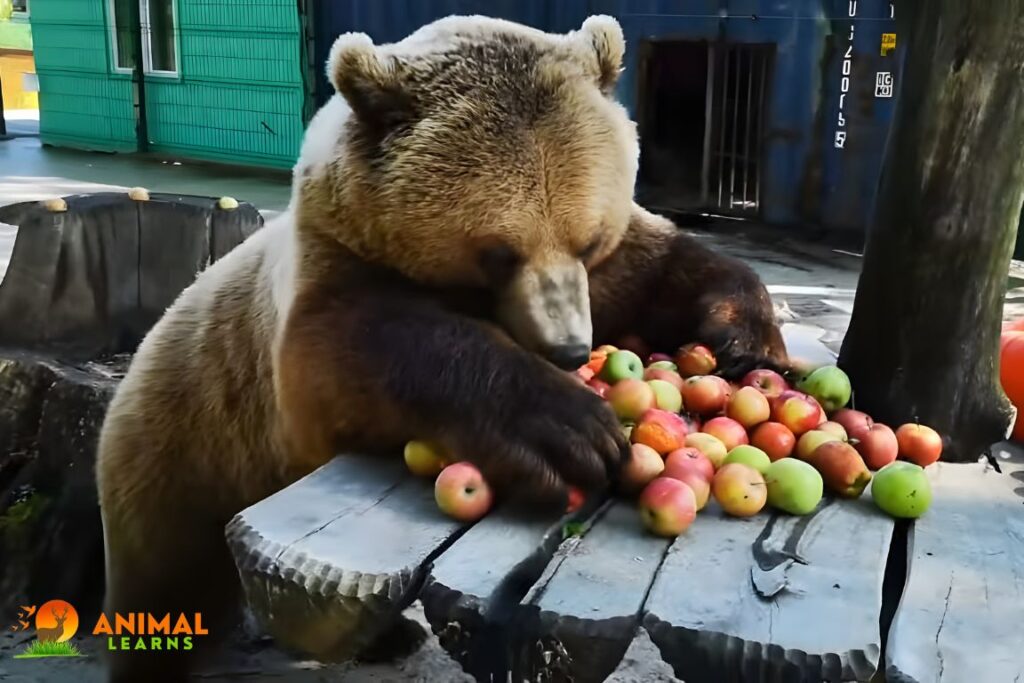
Scientific name (family): Ursidae
Big creatures that consume apples cannot survive only on it. Bears do, however, eat more plant material than meat from animals. As fruit doesn’t grow on the North Pole, extremes like polar bears are exempt from this restriction.
Bears in more southern regions, on the other hand, would happily consume apples and other fruits to reach their daily need of 90 pounds of food before going into their lair for the winter. Apples are not the only plant that bears consume; they will also consume roots, mushrooms, and other fruits.
Squirrels
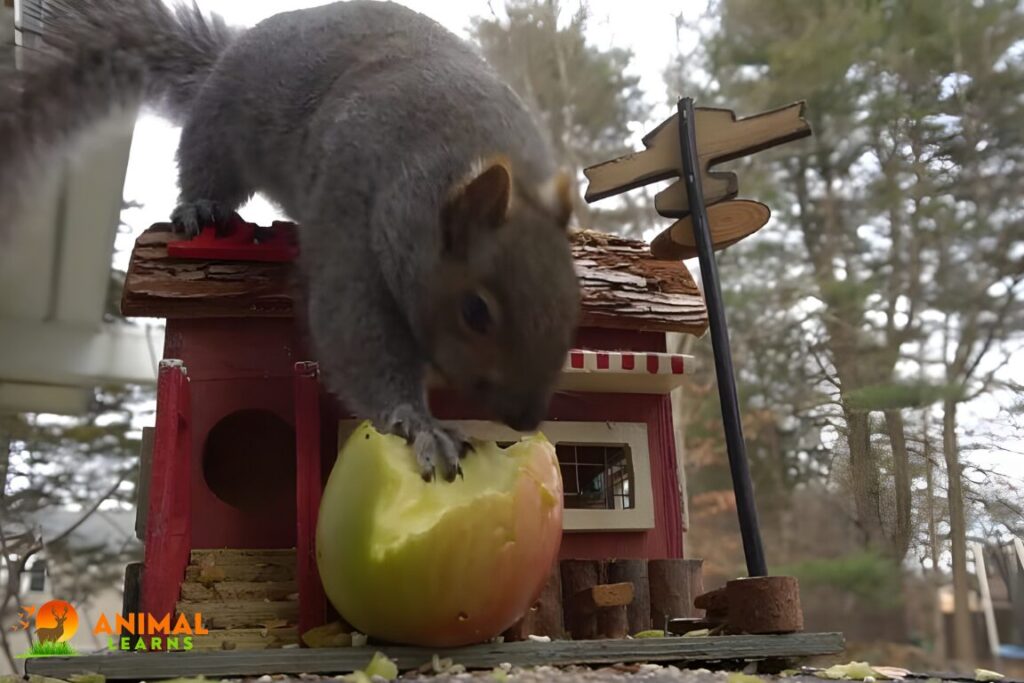
Scientific name (family): Sciuridae
Though it’s unlikely that they can consume much, little animals do eat apples. Because they prefer to eat nuts, squirrels won’t attempt to climb an apple tree if they believe it would be too hazardous. They can climb trees rather well, though, and they will even take an apple straight from the tree if they think it’s safe to do so.
Some people even slice up apples into little pieces and offer them to wild squirrels. But for one squirrel, one apple is already too much. Since these little creatures don’t have large stomachs, the whole family may benefit from coming upon a wild apple tree.
Foxes
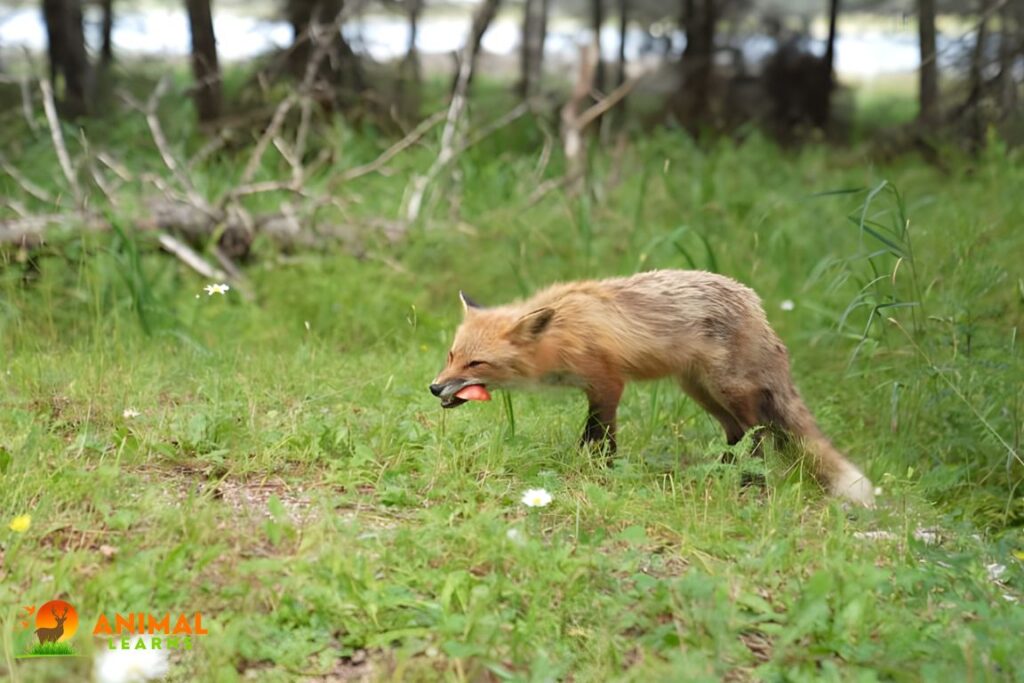
Scientific name (family): Canidae
Given their history of omnivory, foxes are known to frequently consume apples as a snack. Even though these wild creatures prefer to eat tiny animals whenever feasible, they will droolin the sight of an apple.
Additionally, foxes require around two pounds of food every day to thrive, so apples make a good addition to their diet. It’s important to note that grey foxes are particularly skilled climbers and may scale trees in search of food that hangs from branches.
Monkeys
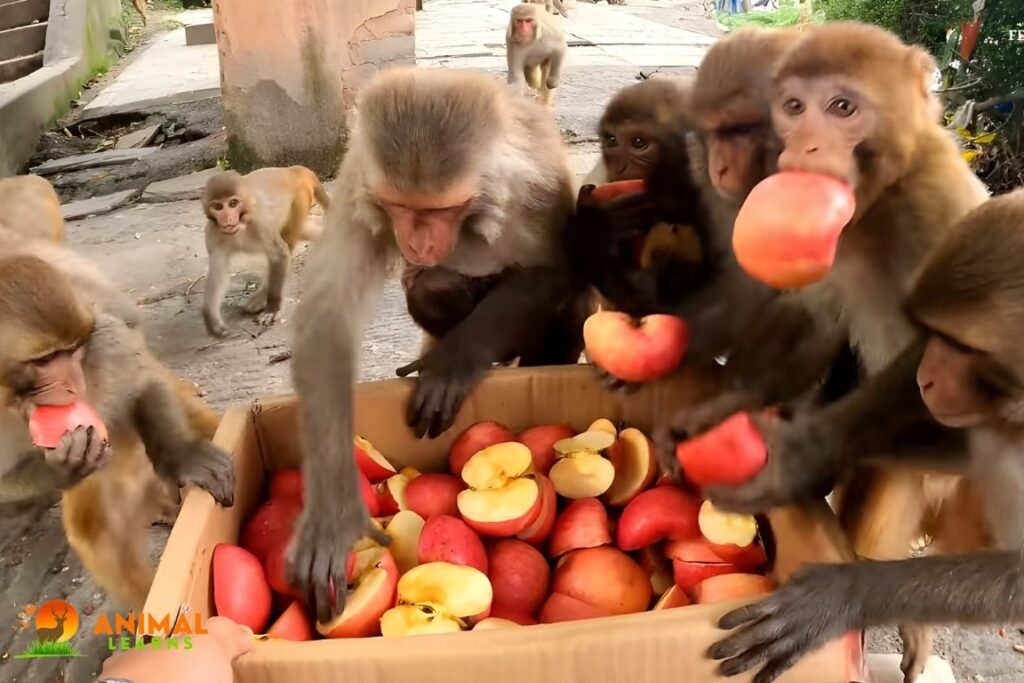
Scientific name (order): Simiiformes
The intelligent and inquisitive monkeys recognize the delicacy of mouthwatering apples, but they don’t stick to one variety of fruit.
Luckily, they can find a wide range of fruits all year round because of their mobility. But since apples are a wholesome, high-energy food that can easily keep a monkey’s tummy filled, apple season is a particularly fantastic time of year for them.
Monkeys love to hang from apple trees and drag each other up in quest of these delicious delights, in addition to enjoying eating apples by themselves. It doesn’t take long for this joyous orchard to be completely wrecked as a family gathers around an apple tree.
Goats
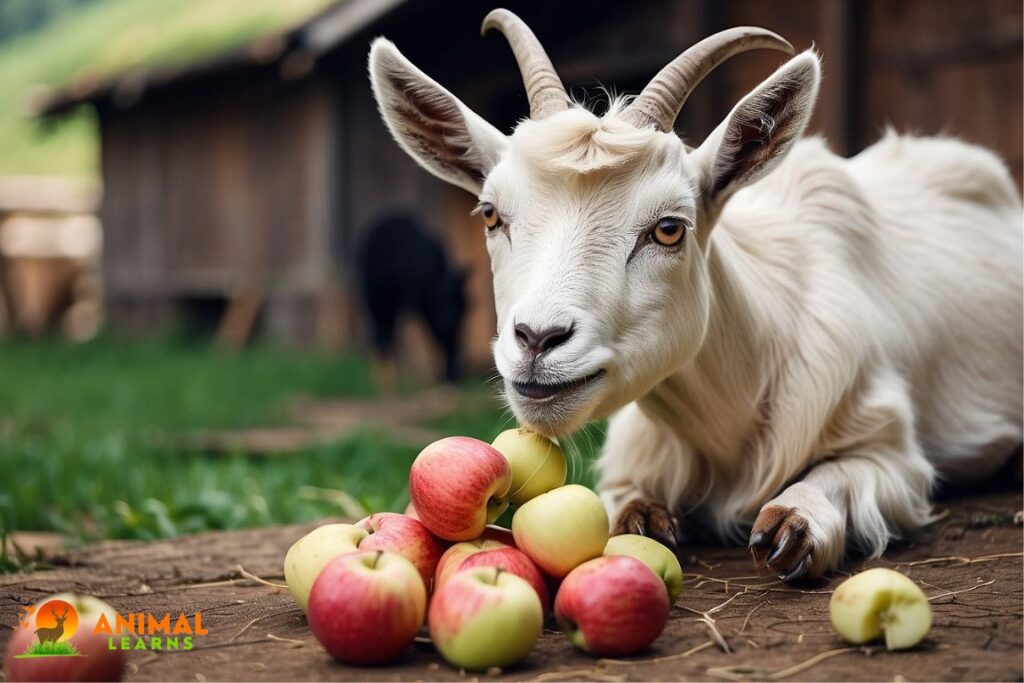
Scientific name (genus): Capra
Whatever the species, apples are very sweet to goats. Wild goats will eat apples when they get the chance, but domesticated goats are the only ones that can be kept on farms. Since many of these species are found in woods, where apples may be hanging high on the trees or spread out, this involves some rather intense acrobatics.
The nine different species of goats are skilled climbers who don’t hesitate to reach those delicious branches, but they also frequently scavenge off the ground for fallen fruit.
Deer
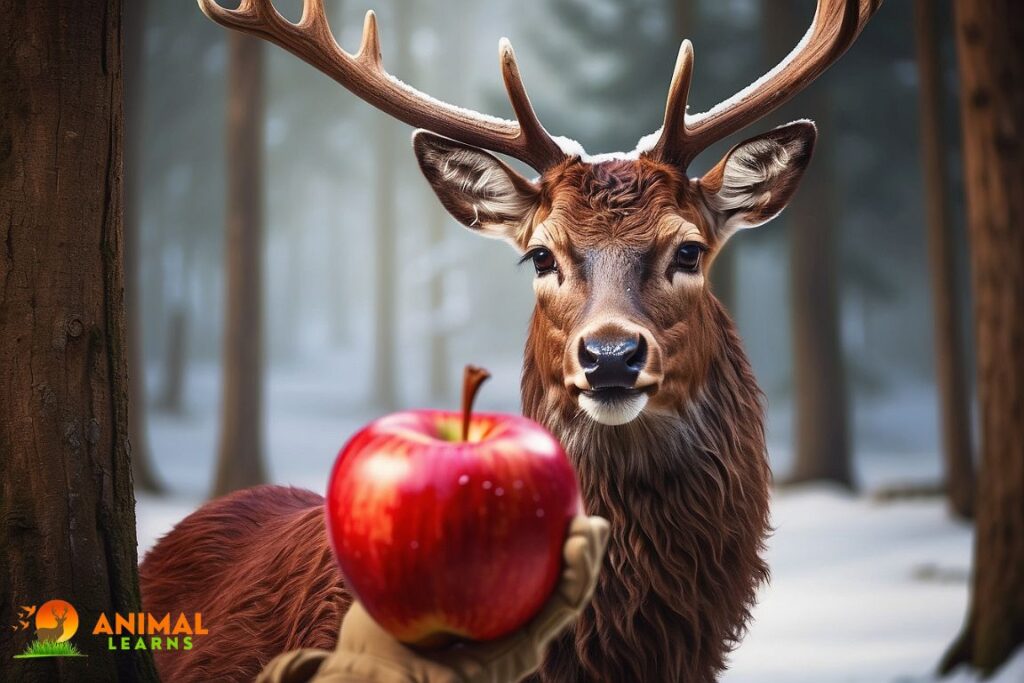
Scientific name (family): Cervidae
What animals eat apples?” often arises, prompting readers to delve deeper into the dietary preferences of different wildlife species. When deer find fruit, they will eat practically everything, and apples are definitely on the menu. The fact that deer are so tall and nimble makes them especially challenging to handle. These characteristics allow them to hop over fences with ease and eat apples straight off the tree in someone’s yard.
Deer won’t do this, though, unless they are positive that no one is nearby since they dislike interacting with people. Although deer seldom get to eat apples in the wild, if they come upon a tree, they will try to eat every apple that is on it.
Panda
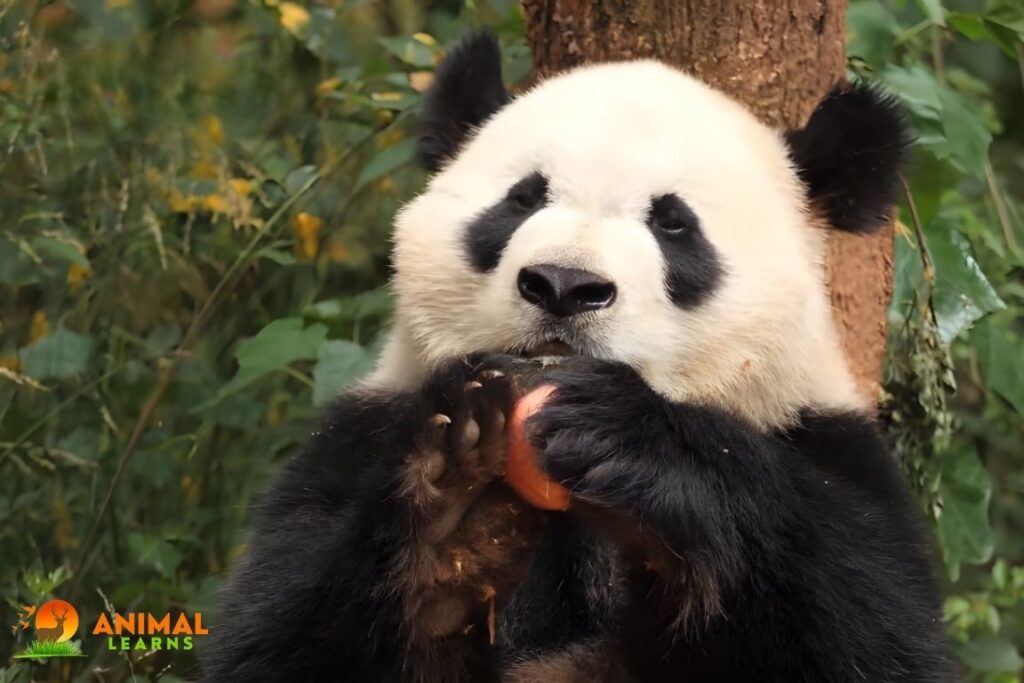
Scientific name:Ailuropoda melanoleuca
Of all creatures, pandas are among the most adored. They have an endearing personality, loving eyes, and distinctive black and white fur. The food of pandas, however, maybe the most remarkable feature of all; they practically just consume bamboo!
Apples, on the other hand, are one of the few foods in their diets that they appear to especially enjoy—apples are an exception. Compared to the monotonous artificial food that pandas kept in captivity occasionally have to eat, apples are a tasty treat that is packed with all the nutrients pandas need to keep healthy.
Opossums
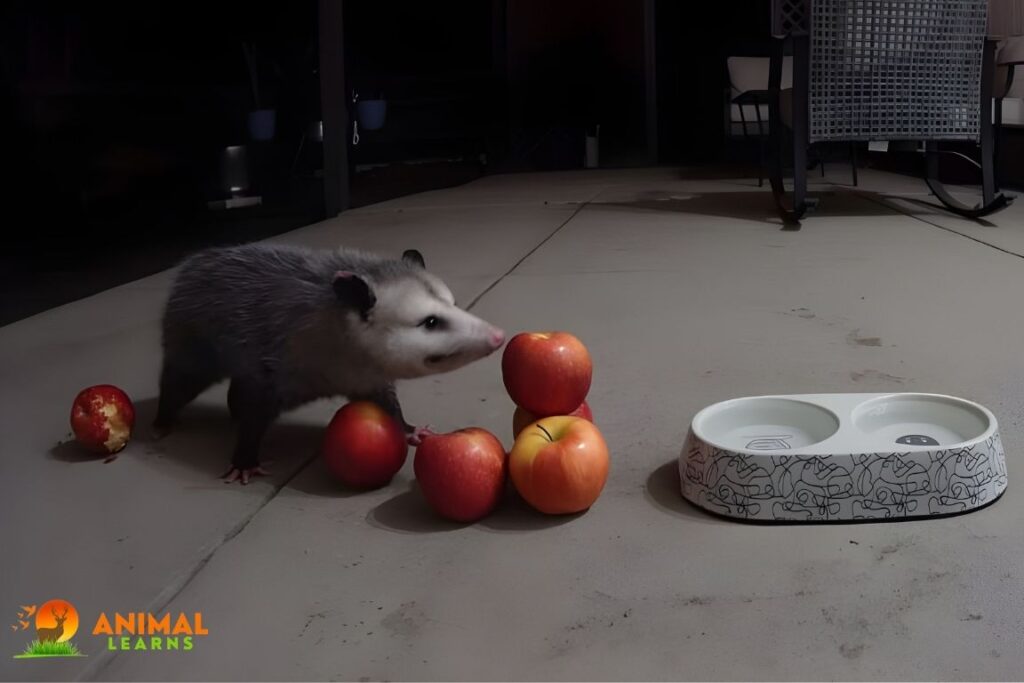
Scientific name (order): Didelphimorphia
Because they will consume nearly anything that gets in their way, opossums and raccoons are quite similar. These little creatures also consume apples, along with eggs, fruits, and dead animals.
Although there are more than 120 species of opossum, in the wild they mostly consume apples that have dropped to the ground. However, some of these species are adept climbers and can go up trees in search of food.
Rabbits

Scientific name (family): Leporidae
Despite being herbivores, rabbits mostly consume fruit and vegetables, however finding wild apples can be challenging. When a rabbit does manage to locate one, it’s regarded as a wonderful pleasure.
A rabbit’s regular diet of grass and other plants would not last nearly as long as a single apple, which may readily satiate a rabbit’s desire for hours on end. It follows that rabbits are apt to gravitate toward gardens to search for any apples that may be scattered around the ground.
Rats

Scientific name (genus): Rattus
Plants are an excellent source of nutrition for rats, who will eat anything to survive. They can readily climb trees and eat the apples that fall from them, but they also have little trouble creeping about and stealing.
Rat infestations are thus not unusual. However, since rats don’t require a lot of food, it’s improbable that one rat will consume more than one apple each day. They could, nevertheless, take hold of an apple and carry it until later.
Badgers

Scientific name (family): Mustelidae
Being omnivores, badgers have few dietary preferences, making them an impressive species. When they are unable to access alternative food sources, they frequently consume fruit even though they prefer meat over vegetables and other plants.
Having said that, badgers are just as likely to be seen hunting for leftovers like rotten apples as they are mice or frogs! Remarkably, some naturalists have even reported seeing badgers get drunk from the alcohol in fermenting fruit. But putting that aside, we also can’t overlook their extraordinary aptitude for employing digging and burrowing as methods of excavation.
Moose
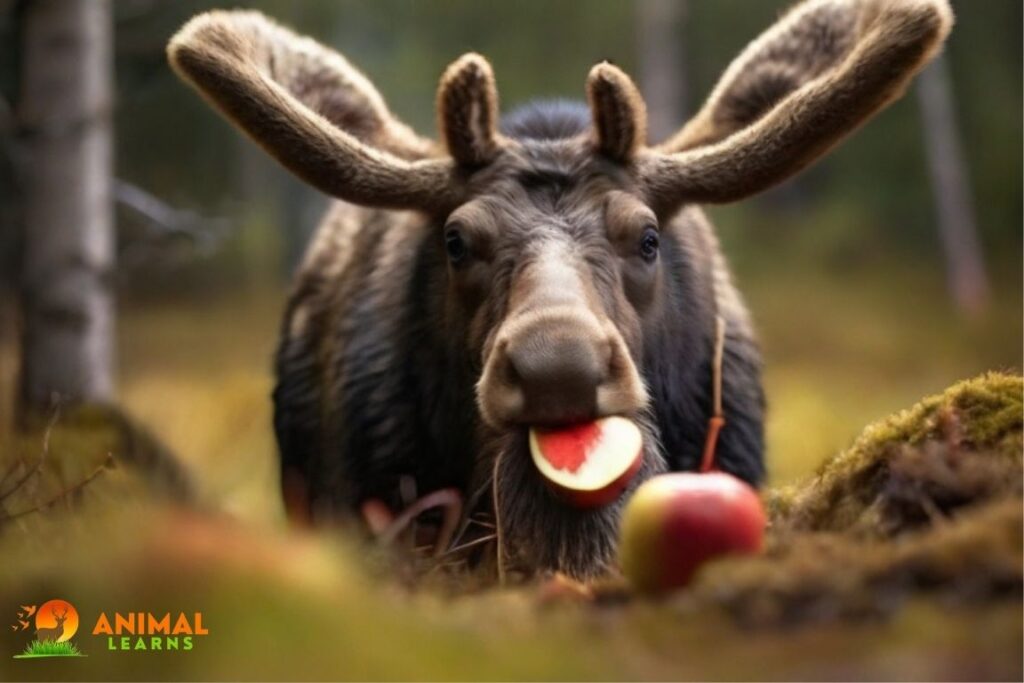
Scientific name: Alces alces
These enormous herbivores can consume the majority of fruit species and require almost 10,000 calories daily to maintain their body weight—five times more than the ordinary person!
While apples seldom grow in locations where moose reside since they prefer colder weather, they will consume them in the wild if they can. They are very finicky eaters that only consume the foods that are highest in calories. They won’t even eat plants.
Hedgehog
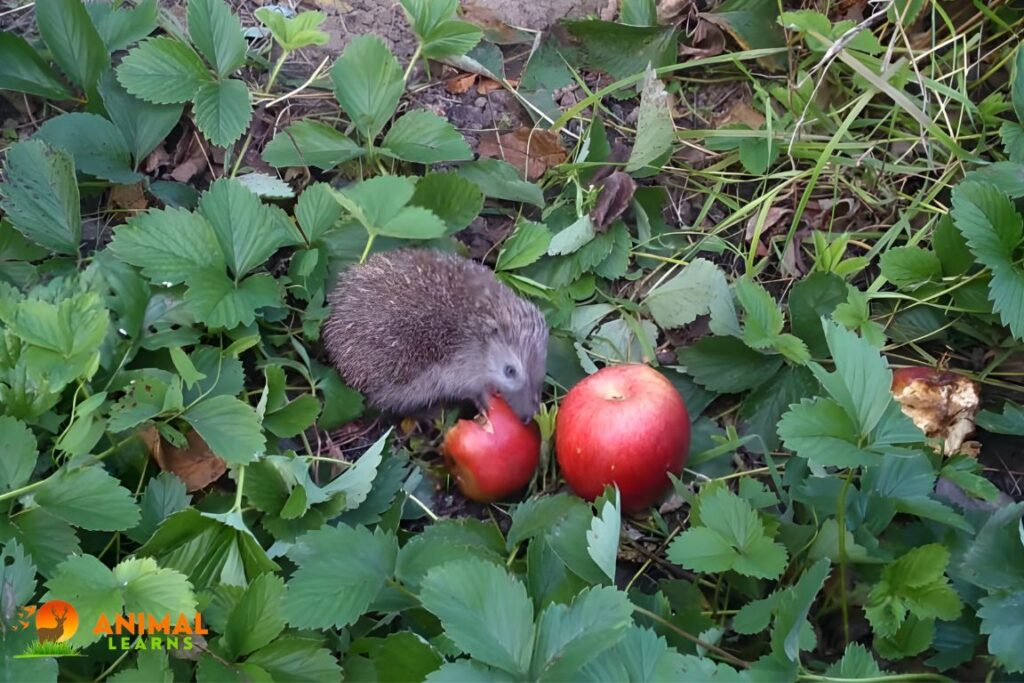
Scientific name (subfamily): Erinaceinae
Hedgehogs truly enjoy eating fruit, even though they might not be the first creatures that come to mind when you see bits of fruit on the ground. They will even willingly enter gardens and other areas frequented by people. Surprisingly, this happens more often than you may imagine because hedgehogs don’t usually naturally fear people.
Their favorite food is generally insects, snails, or even snakes, however, they may occasionally nibble on an apple if they find one. Even worse, they won’t discriminate and will eat fresh food from any source.
However, it’s crucial to make sure that these animals consume meat to receive the right nutrients rather than depending just on fruit for energy.
Pigs

Scientific name: Sus scrofa domesticus
Pigs will eat almost anything when given the chance, so you should make an effort to provide your pigs with a balanced diet. Pigs should also be fed small amounts of fruit and fresh greens in addition to nutritious grains.
Although they enjoy eating apples, pigs will also consume melons and grapes. If you can give them some variety, they will be quite content.
Wild Boars
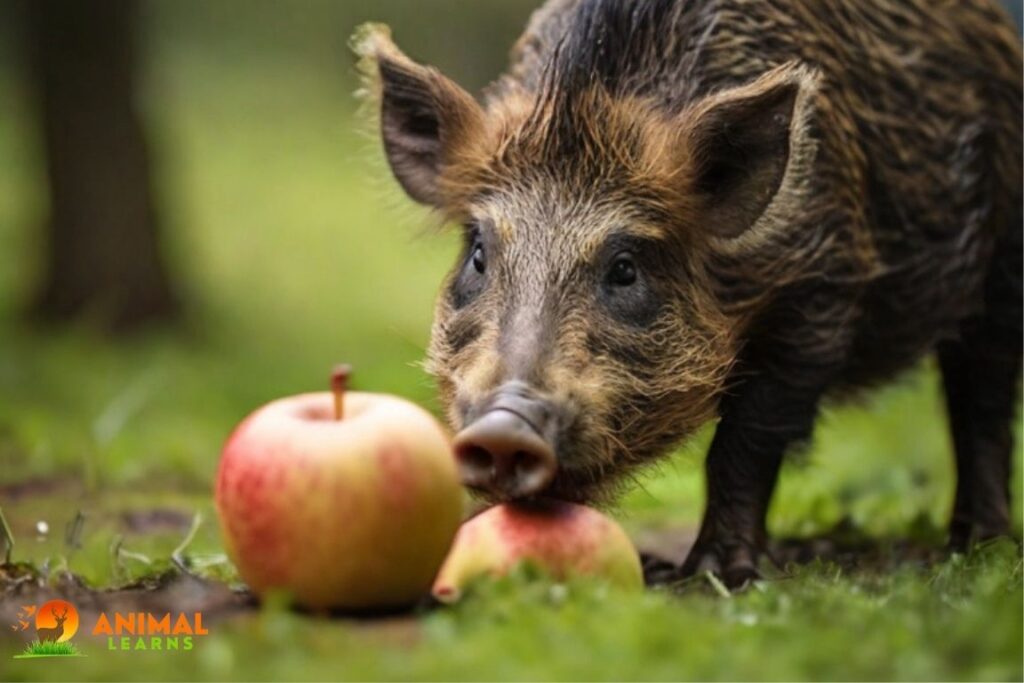
Scientific name: Sus scrofa
Many apple growers view wild boars as a nuisance due to their strength and disposition. Despite being unable to climb trees, these remarkably clever animals utilize their bulk to slap trees, causing apples to fall to the ground. It’s conceivable for them to break into an apple orchard and devour everything in their path since they are powerful enough to tear holes in fences.
For these omnivorous creatures to thrive in the wild, an apple orchard provides an abundance of food. Given that they require around 4,000 calories per day to maintain their body weight, wild boars have a very varied diet. They consume apples with great energy.
Are Apples Good For Animals?
Apples provide a lot of nutrients. They are a good source of vitamin B5 and vitamin K and a great source of vitamin C. Apples are also a fantastic source of fiber.
Apples are plentiful and relatively affordable in the fall. Free windfall apples, which have fallen from the tree but are still edible for animals, are also available.
Is It Safe to Feed Apples To Pet Animals?
Pet animals may safely be fed apples, but you need to take out the seeds. Although seeds don’t pose much of a threat in small doses, they do contain amygdalin. This has the potential to transform into extremely deadly hydrogen cyanide once it gets inside your stomach.
Animals are unable to exercise the same self-control that people do when it comes to eating apple seeds and cores. Make sure to remove the core from apples before giving them to animals, especially little ones. Bigger animals, like horses, can consume more apple seeds before experiencing any harmful consequences.
Is Apple Peel Safe for Animals?
Apple peels are incredibly nutrient-dense. An apple with its skin contains up to 19% more potassium, 115% more calcium, 142% more vitamin A, 332% more vitamin K, and 115% more vitamin C than an apple without skin. Despite being extremely healthy, the peel has turned deadly due to the overuse of chemicals in apple growing. Humans may safely consume apple peels after thoroughly washing them, but animals cannot.
In the realm of natural diets, the question of “what animals eat apples” is intriguingly answered by a diverse array of creatures, including deer, rabbits, and even certain birds, each relishing the succulent sweetness of this fruit as part of their dietary repertoire.
Conclusion
Numerous animals like eating apples, both domestically and in the wild. With their crisp texture and plenty of nutrients, it’s no surprise that so many animals feel happy when they get to eat apples.
Many species love apples as a food, however eating apples is mostly beneficial to tiny animals. They provide adequate food for a few days for tiny creatures like rats and squirrels since they are full of fruit.
Big animals also consume apples, but it’s less beneficial for them nutritionally because they would need to consume hundreds of apples to live.
FAQs
What animals like to eat apples?
Apples are a favorite food of many animals (bears, deer, and squirrels), birds (waxwings, robins), and even insects.
Do animals eat apple peels?
Yes, peels are edible to most animals, however some like the meaty insides. Peels are nutrient- and fiber-rich.
What animals eat cooked apples?
Most animals prefer sweeter types, and cooking apples are typically too tart for them. They could still be pecked by birds.
Do cows eat apples?
While not their typical diet, cows can safely eat small amounts of chopped apples as a treat.
Do goats eat apples?
Yes, goats love apples and their high sugar content, but again, moderation is key.
